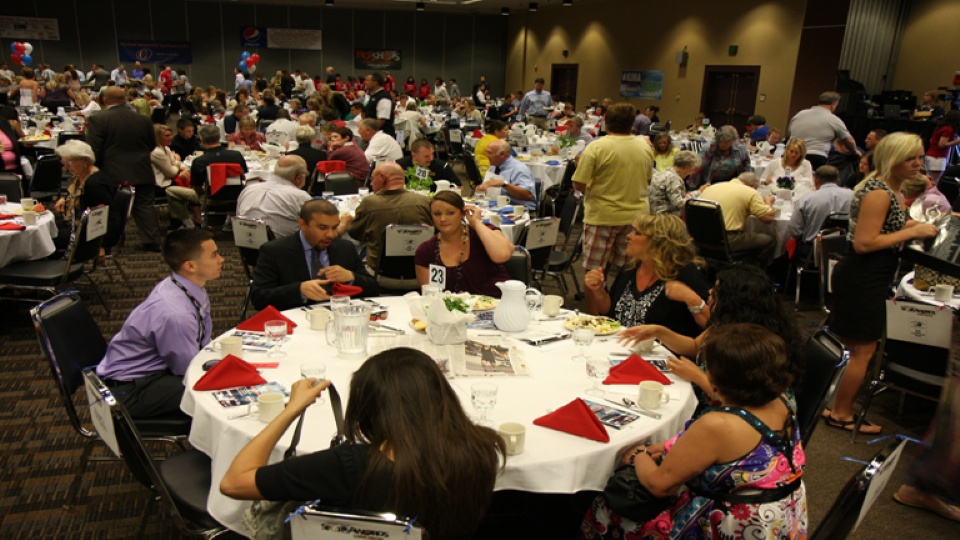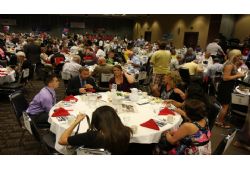On
January 29, 2015, the English Community Organization of Lanaudière (ECOL) held
a first annual meeting and luncheon of the different groups and organizations
that serve the English-speaking community in the region. In total, 34 people
participated, representing 23 groups ranging from churches and schools to
grassroots social clubs and community organizations.
Presentations
were led by Russ Kueber from the Community Health and Social Service Network
(CHSSN) and Dr. Joanne Pocock, independent researcher. Mr. Kueber first
presented the context of the community mobilisation model and some of the
history behind the establishment of ECOL as a regional networking and
partnership initiative ―the 20th one to be formed in Quebec. These
initiatives implement three key action strategies; improving access to health
and social services, increasing the availability of health promotion and
disease prevention programs, and fostering social innovation. By working with
organizations from different sectors, such as health and social services and
education, we make connections, enabling individuals and community groups to
become empowered to take action to decrease social and health inequalities
while improving the different factors that determine the health of the
community. The ultimate goals are to improve the health and well-being of the
English-speaking population and to enhance community vitality.
Dr.
Pocock then presented the participants with information on the demographics of
the English-speaking community of Lanaudière, where English speakers make up
2.5<>percentage<> of the population. The misconception that the English in Quebec possess
much of the wealth was debunked, as Dr. Pocock revealed that 41.1<>percentage<> of the
community has an annual income of less than $20k – in fact, the percentage is
even higher for the north of the region, where 48.8<>percentage<> of the citizens are in
this situation. She also revealed the age differences between the south and the
north of Lanaudière; there are considerably more children in the south and more
seniors in the north. The information was presented in a convivial manner and
was seen to be helpful for community groups who will use it to justify their
applications for funding and garner support for their activities and
initiatives.
After
a buffet-style luncheon, the participants were broken up into sub-groups to
discuss some key questions about their community. Here are some of the comments
we noted;
Question; What are our successes, strengths
and assets?
- We are a cosmopolitan community with a strong history. We have pride in our differences.
- We have a large volunteer base and a strong sense of community engagement. Members of the community look out for each other; we support our seniors. We have many community-organized social and cultural activities.
- Our English schools have good French programs. The young people are bilingual.
- People who have left maintain contact with the community.
- We have a high number of individuals with a university education.
- The churches do a great job of communicating information to their parishioners.
Question; What are some of our weaknesses, obstacles and challenges?
- Public services; It is difficult to obtain written health information in English. Calls from the hospital are always in French and are difficult to understand. Many health care professionals, including ambulance attendants and home care workers, do not speak much English. Even many hotlines do not provide services in English. Our police force is also largely unilingual, and there is a lack of English-speaking specialists for our schools.
- Although those of us living in Rawdon are quite fortunate, many parts of the region have virtually no services in English. Other English-speakers are scattered outside of the main hubs and are therefore more isolated. The English-speaking community is not structured in other RCM’s the way it is in Matawinie. The great geographical distances between communities make it hard for us to connect. Transportation between municipalities is difficult.
- Our volunteer base is aging and there is little succession by younger people. They must leave our region to study in English and cannot always find employment here once they complete their studies. Many employers are reticent to hire English-speakers; some prejudice still remains.
- We have no Golden Age club for Anglos and no English seniors’ residence. Many seniors are immobile; they rely on family or are isolated.
- We have a need for better heritage record
- We agree that we would like to attract the younger generation back to the region.
- More integration is required between French and English seniors. It would be good to have free French conversation classes to help us better communicate with our French-speaking neighbours.
- We would like to see public advertising of activities in English. The idea of having an infrastructure for communication, such as an English newspaper or perhaps one page in the French newspaper. This would be a great project for our youth. Generally speaking, we would like to see more English printed material, especially since not everyone uses internet.
- We would like to be able to reach the south of the region of Lanaudière as well as the north. One means could be to organize activities between the English elementary schools in our region.
- There is a need for a Referral Centre, linking all services, or perhaps a Wellness Centre. We need to ensure that services and programs reach the Anglo community
- Programs are needed for isolated seniors at risk and for single parents.
- We would like to see increased volunteerism of the 40-65 year-olds. Many of our volunteers are very elderly. Volunteers seem to lack confidence and training; perhaps a program could be put into place to address this.
- It would be great to have a transportation system, such as structured carpooling, to bring isolated Anglos to where English activities are taking place.
- We would like to have movies presented in English on occasion. Movie nights in our municipalities are only in French. Or perhaps there could be group outings organized to English cinemas or theatres.
- We need more bilingualism in health and social services. We would like to have first aid and CPR courses in English.
One of the limiting factors to this day of networking and discussion was that most of the participants were from the Matawinie RCM. There were, in fact, no participants from the southern RCM’s of Lanaudière; l’Assomption and Les Moulins. Since there do not seem to be many English organizations or associations in that part of the region, making it difficult to reach the members of the community. The English Community Organization of Lanaudière would like to hear from Anglophones from this part of the territory to learn more about their needs, challenges, and priorities.
In any case, the results of this networking activity have given ECOL a lot to think about and to act on! The participants were unanimous in their desire to repeat this activity on an annual basis.
You can contact ECOL at (450) 421-5379 or by email at ecollanaudiere@hotmail.com. We welcome receiving notices of upcoming activities or information that can be shared with the Anglos of Lanaudière on our Facebook page.
Source; Michelle Eaton-Lusignan
English Community Organization of Lanaudière

 In The Latest Issue:
In The Latest Issue:


 BY:
BY: 



Tweet
Share